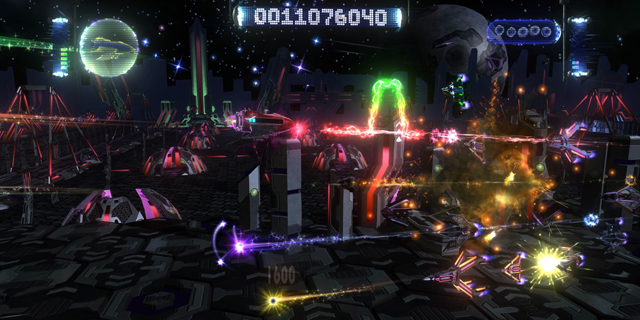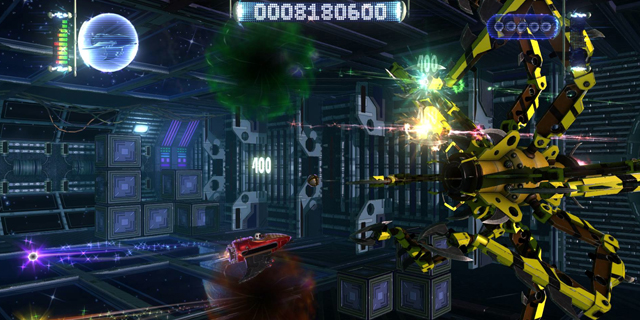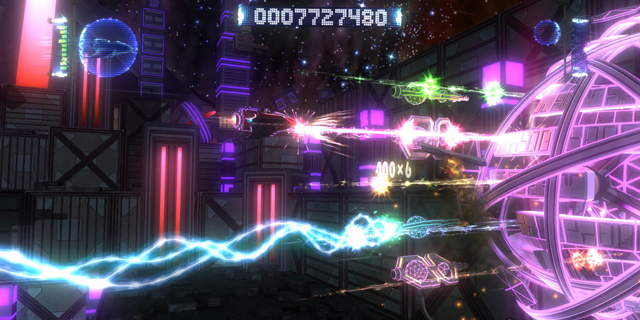
There isn’t much you can do with the shoot-‘em-up genre these days that hasn’t already been done. You usually have a character, sometimes someone in a spaceship, and other times a person who is magically able to fly and shoot projectiles. You often find yourself moving from one end of the screen to the other, shooting down enemies as they show up and doing your best to survive. Now imagine this classic concept in reverse, with you flying backwards in time instead of moving forwards. Add a musical spin on it and you have Retro/Grade, a game that is actually less of a side-scrolling shooter and more of a rhythm game.
The concept is simple: after saving the galaxy, our hero, Rick Rocket, has triggered some kind temporal anomaly that sends him flying backwards through time. He is forced to go through his entire adventure in reverse. In order to prevent the space-time continuum from being disrupted, you are tasked with positing the ship and essentially “catching” your shots as they fly backwards in time while avoiding enemy fire. You score points based on how well you time the button presses and avoid the enemy’s projectiles, with a goal to make it through ten levels of musically-charged “reverse shooting.”

And this is where it becomes a rhythm game, as you find yourself catching your projectiles and avoiding the enemy’s to a beat. With fantastic visuals and a real catchy, toe-tapping soundtrack, it’s hard not to fall in love with Retro/Grade’s presentation. One small problem I found with the visuals is how easy the backgrounds can distract from the main action and how some of the projectiles tend to blend together, especially during the harder difficulty settings. If you play enough it can be easy to adjust to, but it takes some getting used to.
And although most people will use a traditional controller, which works fine, the game also supports the PS3’s guitar controller peripheral, which turns each stage into even more of a rhythm game than before. No matter your preference, you will find that Retro/Grade’s tutorial, practice mode and six difficulty settings make the experience very welcoming to newcomers.

Depending on your chosen difficulty, you will have to deal with anywhere from two to five lanes of projectiles you will need to either catch or avoid. Like a traditional rhythm game, the speed and number of projectiles you need to deal with will also increase based on your chosen difficulty. This gives you plenty of opportunities to replay levels to both better your score and to move to higher difficulties. On top of that, there are different types of projectiles you have to worry about, including missiles that require quick button taps to catch, as well as longer lasers that require you to hold down the button and shift to different lanes. Each level introduces new obstacles until they all culminate into the challenging, final stages.
The most helpful mechanic is the “Retro/Rocket” ability, which allows you to use your fuel gauge in order to reverse time. If you make a mistake (or several) and have available fuel, you can reverse time and try a section again. Fuel is limited, but there are power-ups that refill your fuel on top of adding score multipliers and other bonuses to help you through each level. It’s a mechanic that is absolutely key to clearing some of the harder difficulties, and it gives players a better chance of getting through levels with as few mistakes as possible.
Outside of the main campaign, there’s also a meaty challenge mode. It lays out a map of different challenges, and each challenge has you replay specific levels with different goals. Some challenges make you play through a level to earn certain multipliers, while others will mirror the stage or increase the speed. As you make your way through this mode, the difficulty of the challenges will increase, and depending on how well you score in certain challenges you can find alternate paths that will allow you to skip ahead on the galaxy map. The challenge mode’s twists on each level are well-crafted, and offer a lot of extra variety on top of what you get from the ten basic campaign stages.
Thanks to the different difficulties and the challenge mode, Retro/Grade presents the player with plenty to keep them busy. And with a basic formula that is addictive and doesn’t get old quickly, you will find yourself coming back to it often. Whether you are a fan of shoot-‘em-ups, rhythm games or just want something a little different, Retro/Grade is a worthy purchase.
Pros: Excellent presentation, simple yet addictive gameplay, challenge levels add exciting twists on basic formula
Cons: Projectiles blend together easily and backgrounds can distract on higher difficulties



















